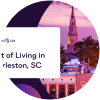10 Largest Cities in South Carolina [2025]

South Carolina isn’t just about sweet tea and sandy beaches (though, yes, you’ll find both in abundance). The Palmetto State is growing fast, and its cities are stepping up with job opportunities, walkable downtowns, and neighborhoods that fit every renter’s lifestyle. Whether you’re drawn to historic charm, a low-key suburban pace, or a city with a booming food scene, you’ll find it here.
This guide breaks down the largest cities in South Carolina by population, complete with rent data, lifestyle insights, and local perks. Think of it as your shortcut to figuring out where you’d actually want to live in South Carolina so you can start your apartment search.
All of the rental data included here comes from Apartment List’s internal database of rent estimates, which is available for download. Transit scores come from Walk Score, and census information comes directly from the U.S. Census Bureau website.
What are the Top 10 Largest Cities in South Carolina?
Populations of the 10 Largest Cities in South Carolina
| Rank | Name | Population |
|---|---|---|
| 1 | Charleston | 150.227 |
| 2 | Columbia | 136,632 |
| 3 | North Charleston | 114,852 |
| 4 | Mount Pleasant | 90,801 |
| 5 | Rock Hill | 74,372 |
| 6 | Greenville | 70,720 |
| 7 | Summerville | 50,915 |
| 8 | Goose Creek | 45,946 |
| 9 | Sumter | 43,463 |
| 10 | Florence | 39,899 |
1. Charleston
- Population: 150,227
- Average rent for a one-bedroom apartment: $2,198
- Average rent for a two-bedroom apartment: $2,607
- Number of currently available units: 672
- Median household income: $95,126
- Walk score: 40
- Transit score: 24
- Bike score: 50
- Map of Charleston
Charleston is South Carolina’s largest city and one of its most recognizable. Think pastel-colored row houses, waterfront views, and a food scene that rivals cities twice its size. Renters here get the best of both worlds: historic neighborhoods with character-packed apartments and modern buildings with luxury perks. Weekends can mean hopping between Folly Beach and Sullivan’s Island, exploring Fort Sumter, or simply indulging in she-crab soup at one of the city’s iconic restaurants.
The flip side? Charleston’s popularity comes at a price. Rents are among the highest in the state, and traffic across the peninsula can be a headache. But for many, the charm outweighs the challenges. Whether you’re looking for a rental tucked into a centuries-old home or a sleek apartment near King Street nightlife, Charleston delivers—if your budget can handle it.

2. Columbia
- Population: 136,632
- Average rent for a one-bedroom apartment: $1,471
- Average rent for a two-bedroom apartment: $1,676
- Number of currently available units: 216
- Median household income: $52,943
- Walk score: 35
- Transit score: 0
- Bike score: 35
- Map of Columbia
Columbia—also known as Soda City—blends the energy of a college town with the gravitas of a state capital. With the University of South Carolina anchoring downtown, renters can expect lively Saturdays in the fall (yes, football dominates) and a steady demand for student housing. Beyond campus, Columbia is building out its cultural footprint with indie theaters, art galleries, and a thriving restaurant scene that’s steadily catching up to Charleston’s.
Rent prices here stay reasonable compared to coastal cities, which means more space for your money. Popular neighborhoods like Five Points and The Vista offer plenty of dining and nightlife, while Lake Murray just outside town gives residents an easy escape from the summer heat. Columbia may not have the beaches, but its central location means both mountains and coastline are weekend-drive close.
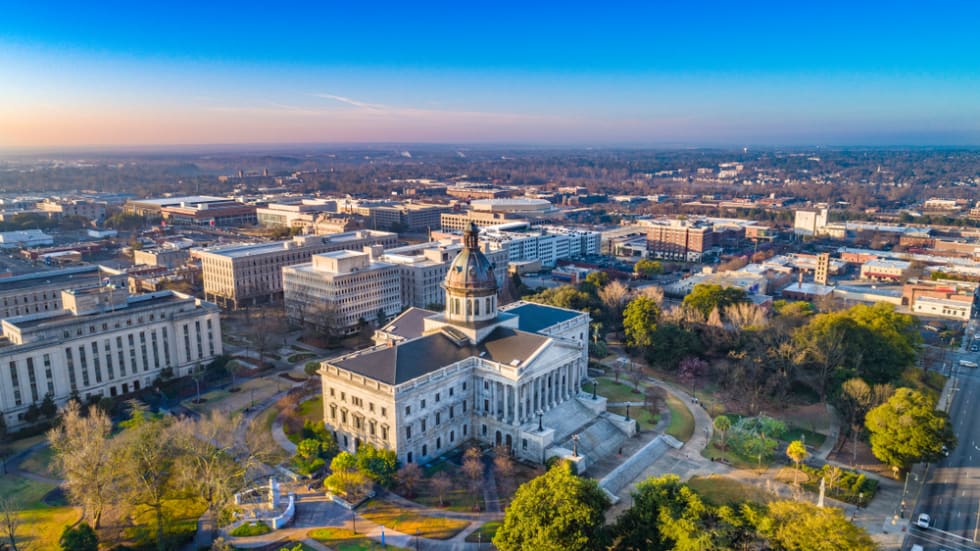
3. North Charleston
- Population: 114,852
- Average rent for a one-bedroom apartment: $1,534
- Average rent for a two-bedroom apartment: $1,686
- Number of currently available units: 151
- Median household income: $64,070
- Walk score: 26
- Transit score: N/A
- Bike score: 38
- Map of North Charleston
North Charleston may sit in Charleston’s shadow, but it’s carving out its own identity. Boeing and Joint Base Charleston keep the local economy strong, while Park Circle’s emerging arts and food scene is drawing renters who want culture without Charleston’s price tag. Apartments range from brand-new complexes with modern amenities to single-family rentals in established neighborhoods.
The city has been pouring resources into parks, green space, and family-friendly activities, making it a popular pick for renters who want affordability without losing access to Charleston’s perks. It’s not as walkable as downtown Charleston, but if you’re looking for value and convenience, North Charleston makes a solid case.
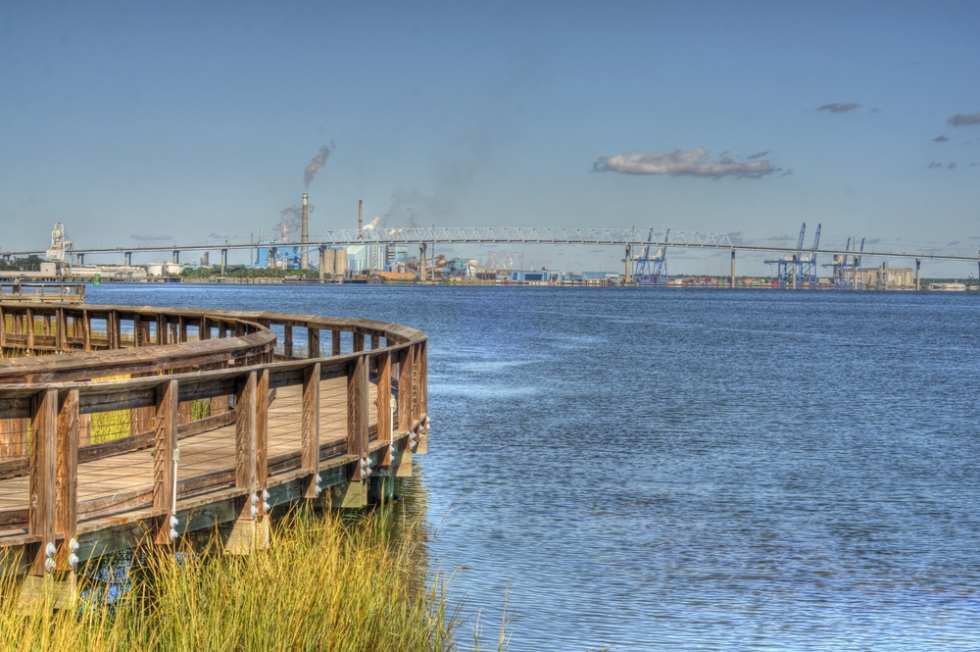
4. Mount Pleasant
- Population: 90,801
- Average rent for a one-bedroom apartment: $2,046
- Average rent for a two-bedroom apartment: $2,442
- Number of currently available units: 73
- Median household income: $127,357
- Walk score: 22
- Transit score: N/A
- Bike score: 38
- Map of Mount Pleasant
Mount Pleasant delivers coastal living with suburban polish. Known for its top-rated schools, new apartment communities, and proximity to beaches like Isle of Palms, it’s one of the most sought-after areas in the Charleston metro. Renters can expect modern units, family-friendly neighborhoods, and easy access to waterfront dining along Shem Creek.
The biggest drawback? Traffic. The Ravenel Bridge may connect Mount Pleasant to downtown Charleston in minutes on paper, but rush hour tells another story. Still, for renters willing to pay higher rent for safety, schools, and beach proximity, Mount Pleasant is worth the commute.
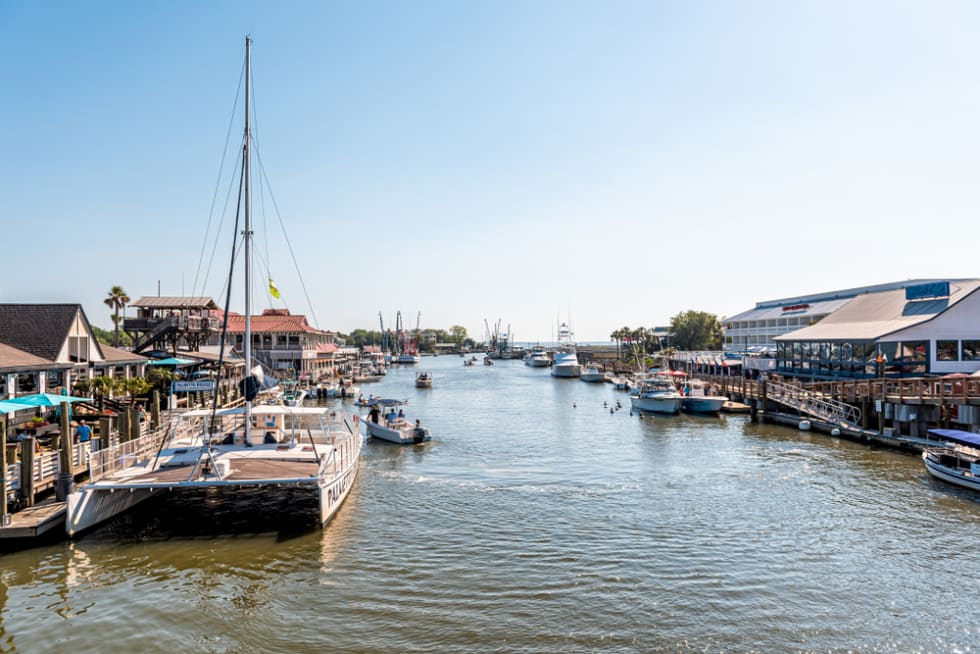
5. Rock Hill
- Population: 74,372
- Average rent for a one-bedroom apartment: $1,337
- Average rent for a two-bedroom apartment: $1,557
- Number of currently available units: 88
- Median household income: $65,397
- Walk score: 28
- Transit score: N/A
- Bike score: 31
- Map of Rock Hill
Rock Hill is a fast-growing city in South Carolina’s northwest corner, just a half-hour from Charlotte, NC. That close proximity means many renters enjoy Charlotte’s job market while paying less for housing back home. With Winthrop University fueling a younger crowd and employers like 3D Systems and Atlas Copco growing the local economy, Rock Hill has more going on than its “suburb of Charlotte” reputation suggests.
The rental market here includes everything from budget-friendly apartments to newer suburban communities with extra space. Outdoor lovers (and their dogs) get easy access to the Catawba River for kayaking, hiking, and biking. While rent prices are climbing, Rock Hill remains an affordable alternative for renters who want city access without the big-city sticker shock.
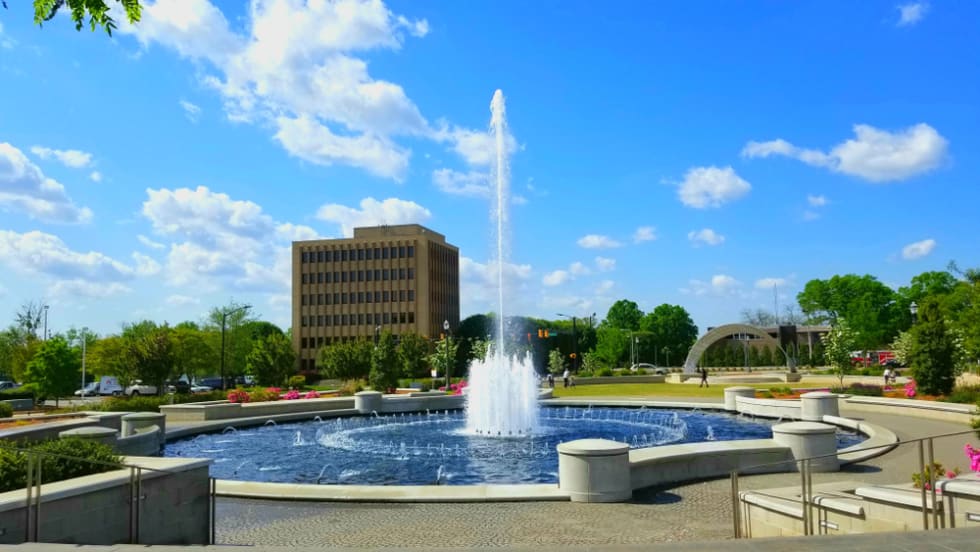
6. Greenville
- Population: 70,720
- Average rent for a one-bedroom apartment: $1,562
- Average rent for a two-bedroom apartment: $1,959
- Number of currently available units: 123
- Median household income: $73,536
- Walk score: 43
- Transit score: 19
- Bike score: 39
- Map of Greenville
Greenville has gone from hidden gem to hot ticket in the past decade, and it’s easy to see why. Downtown’s Main Street is lined with restaurants, coffee shops, and boutiques, while Falls Park on the Reedy River makes the city feel like an outdoor retreat. Major employers like BMW, Michelin, and Prisma Health keep jobs steady, and renters love that the Blue Ridge Mountains are right next door.
Apartments here range from modern lofts in converted mills to suburban complexes with resort-style amenities. Rent is rising quickly, but Greenville’s combination of culture, careers, and nature keeps attracting newcomers. If you want a city that blends mountain air with city energy, Greenville is tough to beat.
7. Summerville
- Population: 50,915
- Average rent for a one-bedroom apartment: $1,570
- Average rent for a two-bedroom apartment: $1,877
- Number of currently available units: 63
- Median household income: $78,621
- Walk score: 21
- Transit score: N/A
- Bike score: 36
- Map of Summerville
Summerville, known as the “Flowertown in the Pines,” delivers slower-paced living just 30 minutes from Charleston. Its oak-lined streets, historic homes, and spring azalea blooms give the town a storybook feel. Every April, the Flowertown Festival takes over downtown, drawing thousands for art, food, and flowers—it’s the largest arts and crafts festival in the state and a snapshot of the community spirit that keeps residents hooked.
For renters, Summerville offers options across the board: charming historic rentals downtown, family-sized houses for lease, and new apartments with modern amenities. It’s a favorite for commuters who want Charleston’s job market without Charleston’s rent—and it’s proof you don’t have to give up small-town charm to get convenience.
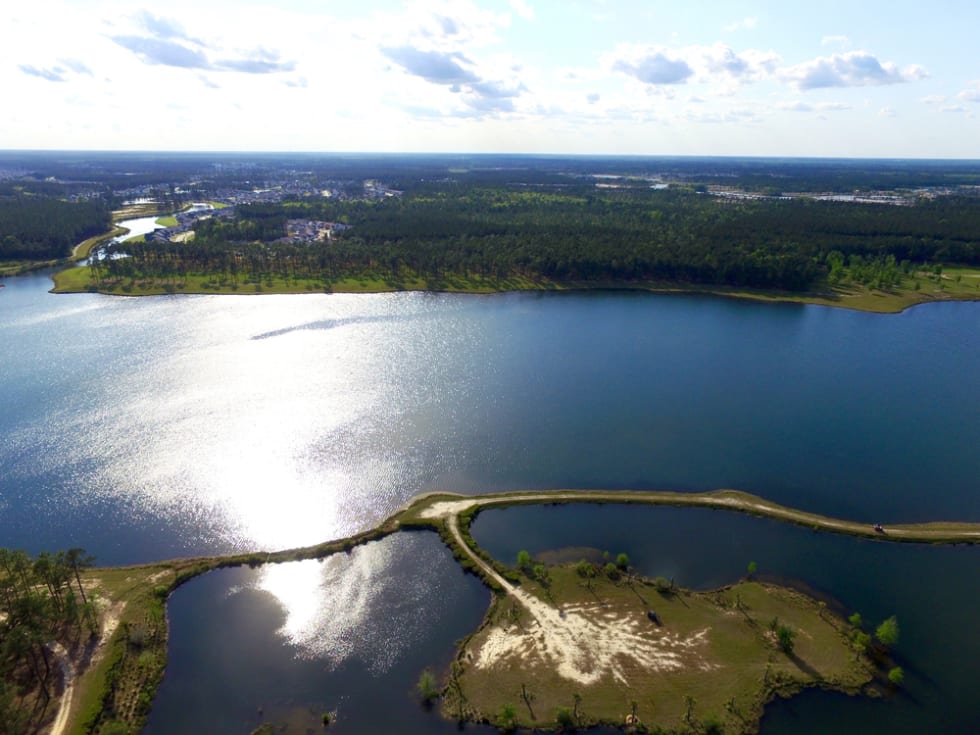
8. Goose Creek
- Population: 45,946
- Starting rent for an apartment in Goose Creek: $1,301
- Number of currently available units: 54
- Median household income: $87,437
- Walk score: 14
- Transit score: N/A
- Bike score: 35
- Map of Goose Creek
Goose Creek is a growing city with deep ties to Joint Base Charleston, which keeps the rental market steady and military-friendly. It’s less flashy than Charleston or Mount Pleasant, but what it lacks in nightlife, it makes up for in affordability. Families are drawn to its schools, parks, and quieter neighborhoods, while the city continues to expand shopping and dining options.
Renters here can expect newer apartment communities and townhomes at lower rates than Charleston’s peninsula or Mount Pleasant. With an easy commute to both downtown and the base, Goose Creek is a practical choice for anyone prioritizing space and value.
9. Sumter
- Population: 43,463
- Starting rent for an apartment in Sumter: $695
- Number of currently available units: 41
- Median household income: $53,071
- Walk score: 25
- Transit score: N/A
- Bike score: 37
- Map of Sumter
Sumter blends affordability with small-city living. Shaw Air Force Base anchors the local economy, which gives the city stability and diversity. Rent prices here are some of the lowest in South Carolina, making it an appealing choice for renters who want space without the financial strain of larger metros.
Lifestyle perks include Swan Lake Iris Gardens—yes, with real swans—along with golf courses, lakes, and local history museums. The entertainment scene is quieter compared to Charleston or Greenville, but if you’re looking for calm, community, and savings, Sumter delivers.
10. Florence
- Population: 39,899
- Starting rent for an apartment in Florence: $800
- Number of currently available units: 33
- Median household income: $56,433
- Walk score: 27
- Transit score: N/A
- Bike score: 39
- Map of Florence
Florence may be small, but it packs in opportunity thanks to its medical and educational anchors: McLeod Health and Francis Marion University. Its downtown has been revitalized in recent years with breweries, live music venues, and a growing food scene—giving renters a surprising amount of nightlife for a city its size.
Apartments here stay affordable, and renters can also find duplexes and single-family homes at rates well below Charleston or Greenville. With Amtrak access and I-95 running straight through, Florence also serves as a convenient center for those who need regional connectivity.
Rent in the 10 Largest Cities in South Carolina
Want to compare rent prices in the largest South Carolina cities? Here's a quick glance at the average rates of one-bedroom apartments currently listed on our website.
| Rank | City | Average One-Bedroom Rent | Current Availability |
|---|---|---|---|
| 1 | Charleston | $2,198 | 672 |
| 2 | Columbia | $1,471 | 216 |
| 3 | North Charleston | $1,534 | 151 |
| 4 | Mount Pleasant | $2,046 | 73 |
| 5 | Rock Hill | $1,337 | 88 |
| 6 | Greenville | $1,562 | 123 |
| 7 | Summerville | $1,570 | 63 |
| 8 | Goose Creek | $1,304* | 54 |
| 9 | Sumter | $695* | 41 |
| 10 | Florence | $800* | 33 |
(*) Starting rent
Need Help Finding an Apartment in South Carolina?
South Carolina’s largest cities each bring something different to the table—whether it’s Charleston’s history, Greenville’s mountain views, or Sumter’s affordability. The hard part isn’t finding options. It’s figuring out which city (and apartment) actually fits your life.
That’s where we come in. Take our Apartment List quiz, and we’ll match you with rentals that check your boxes. With us, you’ll spend five minutes and save 50 hours searching.
FAQs about the Largest Cities in South Carolina
What are the three largest cities in South Carolina?
Charleston, Columbia, and North Charleston are the big three by population. Charleston takes the crown as the largest, Columbia runs the state as the capital, and North Charleston is the fast-growing industrial hub.
What is the nicest city to live in South Carolina?
It depends on your priorities. If you want history, food, and coastal living, Charleston is hard to top. For affordability and a central location, Columbia wins. If you’re chasing mountain views with a buzzing downtown, Greenville might be your match.
Is Greenville bigger than Charleston?
Not by population—Charleston still holds the title. But Greenville’s metro area is larger, meaning the city punches above its size when it comes to jobs, culture, and overall growth.
Is Columbia bigger than Charleston?
Nope—Charleston edges out Columbia in terms of South Carolina population. That said, Columbia spreads wider, so it feels less compact than Charleston’s walkable historic core.
Is Greenville bigger than Columbia?
Columbia is larger by population if you look within city limits. However, if you incorporate the greater metropolitan area for both cities, Greenville is slightly larger.
What is the smallest city in South Carolina?
That honor goes to Smyrna, with 55 residents. But if you’re sticking to this list, Florence is the smallest of the top 10 cities.
Share this Article




